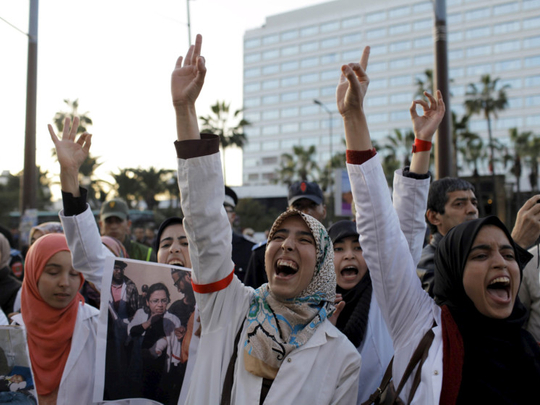
Rabat: Thousands of Moroccan trainee teachers and their families took to the streets of the capital Rabat on Sunday to protest against government plans to cut education jobs, defying an official ban on demonstrations.
Several thousand protesters marched past hundreds of riot police who watched nearby with water canon trucks, just weeks after police stopped an earlier protest.
Large-scale protests remain rare in Morocco, where the king holds sway. When pro-democracy unrest toppled leaders in Tunisia, Egypt and Libya in 2011, the palace calmed similar protests with limited reforms, spending and tougher security.
The teacher trainee protests are one of several rallies that have taken place in the last few months against government plans to cut spending and reduce public sector hiring as part of reforms meant to revive state finances.
“I have three children, and I thought we had finally found a job for one, but it doesn’t seem so,” said Hassan Dehih, who came from the city of Kenitra to support his daughter. The government said on Thursday that it would not allow any unauthorised protests. More than its North African neighbours, Morocco has been applauded by multilateral lenders for progress in controlling high public spending that analysts says has also been a problem in neighbouring Tunisia and Algeria.
But touching public jobs, subsidies and other benefits that Moroccans have enjoyed for years is starting to generate social tensions, triggering protests, sit-ins and strikes that may test the government’s nerve.
In neighbouring Tunisia, frustration over unemployment and lack of jobs last week exploded into rioting in a string of towns, especially in the impoverished central city of Kasserine, but a curfew helped restore calm.
Around 10,000 young Moroccans passed the examination to begin training to be teachers in public schools. On Oct. 8, the government said another exam would be required at the end of the year to be hired. Only 7,000 would pass the final tests, according to government data.
Rachid Oussaid, a spokesman for trainee teachers, said the government had held talks with protesters on Saturday, in a meeting facilitated by labour unions.












